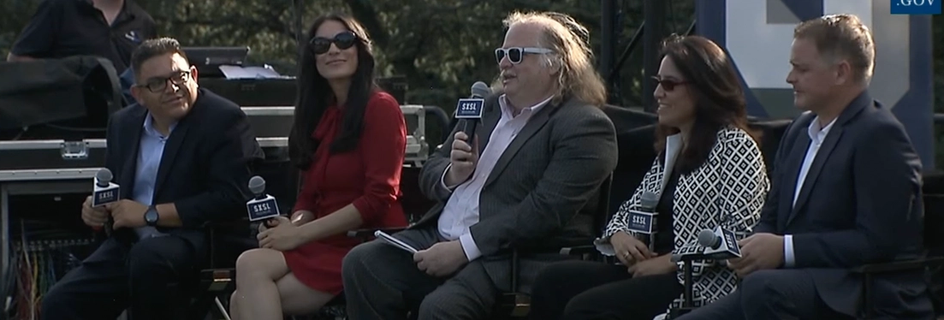LA2050 Blog
We’ve got access to the information that every Angeleno needs to make an impact. Our blog features the latest LA2050 news, announcements, features, happenings, grantee updates, and more.

Our favorite moments from #SXSL!
PostedLike many Angelenos, we couldn't be happier that a conversation about Los Angeles (and all the exciting change going on here!) was given a national spotlight at the first-ever South by South Lawn (SXSL) festival, hosted at the White House on Monday, October 3.
Inspired by the South by Southwest (SXSW) conference and festival, the White House's version brought together leaders, artists, activists and innovators to celebrate people making positive change. SXSL was also a call to action, an opportunity for changemakers to share best practices and inspire even more engagement around issues ranging from sustainable food to social entrepreneurship to climate change (and more!).
And guess which city was spotlighted as an exciting place for innovation? Of course, LA!
The panel discussion, entitled “ LA: A Case Study in Innovation," was moderated by Pulitzer Prize-winning Los Angeles Times food critic, Jonathan Gold. He led a conversation about how LA is changing (for the better!), what this looks like across sectors, technology's role and the lessons to be learned from it all. Panelists included:
- Yael Aflalo, Founder and CEO of sustainable LA fashion label, Reformation;
- Krisztina 'Z' Holly, host of The Art of Manufacturing podcast and Chief Instigator of Mayor Garcetti's MAKE IT IN LA initiative;
- Oscar Menjivar, Founder and CEO of URBAN Teens Exploring Technology; and
- Brian Mullins, a pioneer in Augmented Reality, Human Machine Interface and Computer Vision.
Here are our favorite moments from the conversation:
- “Businesses can make a difference in communities; they can make a difference with food deserts." - Jonathan Gold [on Locol].
- “When we surveyed businesses in LA about creating and making, we found that nearly half of businesses were minority and women-owned. So it shows a very different face of entrepreneurship than what we see in the media." - Krisztina 'Z' Holly
- “LA is a microcosm of the world. So it pulls together all these different cultures. I think there's something like 40 different nationalities where the second largest population in the world is in LA. So it causes new creativity to come out of that and then it also means that LA is a huge market that enables us to reach and test and iterate on our innovations." - Krisztina 'Z' Holly
- “The beauty of LA that we're starting to find is that more and more teens from the inner city, more and more teens from poor and working class communities are starting to innovate, and the more resources we're starting to provide to them, the more they're starting to come up with their own solutions for their own community." - Oscar Menjivar
- “The LA River, for people who don't know about it or just think of it as a joke on late night TV, is being redeveloped in sort of an astonishing way, as an open space, as a recreational space, as a new center of Los Angeles. It goes on for 40 miles. … It's something I think we're all looking forward to experiencing for the next 40 years." - Jonathan Gold
- “I think Los Angeles is going through a renaissance right now, so I think people from across the country are moving to LA. I think it really is a hub for creativity right now." - Yael Aflalo
- “It's an amazing place to devote yourself to something. There's so many resources; there's such a diverse workforce — amazing people coming from entertainment, from technology. And it really is…the intersection of all those things." - Yael Aflalo
- “What you're talking about is how corporations and government have to think about the best interest of people in general and solve these problems in a bigger way. I think there is often a temptation for people to look and see the strengths and weaknesses of government and the strengths and weaknesses of corporations, and especially sometimes they try to route around each other. Neither gets better when that happens. I think if you focus at how you can collaborate and make legislation that's going to help both, that's really the only way to do that in the long-term." - Brian Mullins
- And OF COURSE, we loved the LA2050 shoutout from our friend, Oscar Menjivar, talking about cross-sector partnerships to expand economic opportunities for underserved communities:
“When we were first starting [URBAN Teens Exploring Technology] and told people 'we're ending the school to prison pipeline,' not only did corporations, but foundations, like the Riordan Foundation, jump on board, or the Durfee Foundation, or LA2050 jumped on board and said 'let's help this cause. It's important that LA has a good workforce in the future.' So I think that collaboration — again — that is coming from all sectors and is helping understand that there's talent in South LA, there's talent all over Los Angeles whether it's in the valley or downtown, we're willing to nurture that talent, we're willing to bring up and foster that talent as a community in LA."
You can watch the full video of the panel below. Enjoy!